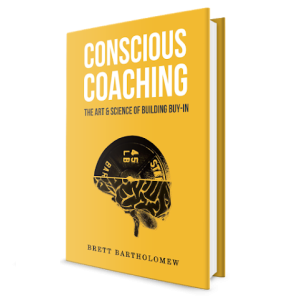















Brett Bartholomew is the founder of Art of Coaching, a company which teaches communication strategy to leaders, best-selling author and keynote speaker. He’s also a trusted performance coach who spent 15+ years working with Olympic and pro athletes, top leaders in tech, finance, the military, and beyond - always with one focus: making communication practical, not theoretical.
Conscious Coaching is a playbook for business owners who know that getting buy-in is the real game.
If I was starting my journey over, this would be one of the first resources I’d equip myself with.
I asked Brett what drove him to write Conscious Coaching for leaders. He was blunt: after nearly losing his life to a medical mistake, he became obsessed with the impact of communication - good and bad. From his early days as a strength coach, he saw that even the most talented people fall short when they can’t connect, lead, or navigate tough conversations. That’s why this book is here: to help business owners develop the self-awareness, adaptability, and interpersonal skills you can’t fake.
“The real game is in how you communicate, build trust, and adapt.” — Brett Bartholomew
Most business owners struggle with buy-in and getting their team, clients, or partners to move in the same direction. Brett doesn’t sugarcoat it: poor communication is the silent killer of growth, culture, and results.
One of the things he said on the tBOJ podcast that hit home was “Poor communication is guaranteed to make every part of your life worse. Every part.”
Conscious Coaching tackles the messy reality of leadership: navigating personalities, breaking down silos, and moving past superficial advice to real, repeatable strategies for influence.
The sections on “Archetypes”. One of the principles of the book is that you can’t lead everyone the same way, and he maps out personality profiles you’ll recognize in your team, clients, and even yourself. I'm a big proponent of style and strength assessments, and the better you know the personalities around you the better equipped you can be to connect with them. People feel heard, conversations move forward, and tough issues can be better addressed.
I asked Brett what challenged his thinking while writing. He explained that most people think they’re good communicators, but almost no one has an honest system for feedback. During his doctoral research, Brett found that leaders routinely overrated their skills. “When we asked how they evaluated themselves, most admitted they had no real tool, just gut feel. That disconnect costs companies more than they know.” It's not unusual for people to resist working on communication because they see it as “soft,” even when it’s their biggest bottleneck.
Brett mentioned, and I agree: business owners skip self-reflection and try to apply new frameworks without changing their own habits. They jump to tactics (“give me the script!”) instead of developing true contextual competence. He said, “If you think you can lead with a script, you’ll get exposed the first time things go sideways.”
Another trap: treating every team member or client the same way and ignoring the differences in motivation, style, and feedback preferences. That’s a recipe for misalignment and frustration.
Brett’s advice:
The fastest win: stop treating communication as a soft skill. Make it a system you actually practice and measure.
I’m a big fan of Conscious Coaching because Brett does what most “leadership” books won’t: he tells the truth about what holds leaders back and gives you a path to fix it. If you run a business and you care about leading people - not just managing tasks - you need to know Brett.
Ready to level up?
If you’re serious about building buy-in, self-awareness, and true leadership skills that stick, Conscious Coaching is the place to start.
If you want the inside story straight from Brett—and actionable advice you can use today—catch our conversation on The Business Owner’s Journey podcast.
Related Podcast Episodes: